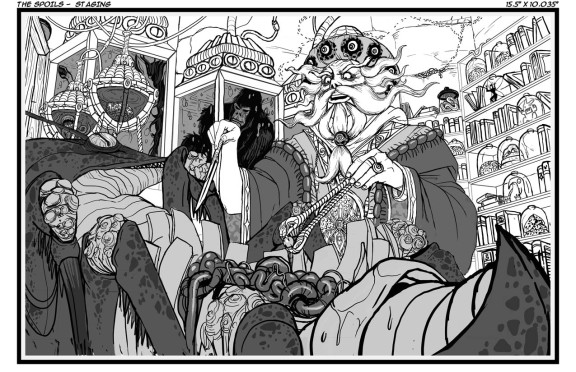
In Tuesday’s post, I made a few references to orcs being organized into evil armies by chaotic wizards. There is probably nothing in role-playing less in need of mechanical support than how a villainous wizard gathers an army of orcs. You want a bad wizard, you make a bad wizard; you want him to have orcs, he has orcs. The only time you could possibly have even the most remote need for a system to support this is if that foul mage is one of the player characters.
But why shouldn’t she be? We’ve had spells in D&D for a long, long time implying that other party members wouldn’t automatically turn on the wizard if he raises a few undead servants. Isn’t it equally possible that the party might be willing to put up with a little orcish brutality if it gives them a few more meatshields? So just in case that comes up, here’s a 5th level wizard spell for DCC RPG. I don’t know if this is really balanced with other 5th level spells, but hey, orc army!
Summon Orcs
Level: 5 (Wizard)
Range: Varies
Duration: Special
Casting Time: 1 week
Save: None
General: The caster calls a band of orcs to serve his sinister plans. The orcs summoned will serve the wizard until they die or until their master suffers a decisive defeat in battle (judge’s discretion). However, the wizard must set the orcs about some task that shows the promise of regular bloodshed and savagery.
To cast the spell, the wizard must have a permanent dwelling worth at least 10,000 gp. Once successfully cast, the wizard must be at the dwelling when the orcs arrive or they will wander off. The wizard need not wait around for new orcs if he already has orcish servants residing in the area around the dwelling. The orcs that arrive will be equipped with the equivalent of leather armor and a long sword.
Neutral wizards suffer a -4 spell check penalty when attempting to cast this spell; lawful wizards cannot cast it at all. If the wizard’s patron is strongly associated with orcs, they gain a +4 spell check bonus. A +1 spell check bonus is gained for every full 100 orcs already under the wizard’s command as the strengthening horde attracts ever more minions.
Manifestation: Roll 1d3: (1) The area around the dwelling grows foul, as foliage falls from dying trees and water becomes brackish; (2) A sigil of balefire appears in the sky above the dwelling; (3) Thunder clouds darken the sky above the dwelling, rumbling and crackling with lightning and dropping acid rain.
Corruption: Roll 1d6: (1) The caster’s nose transforms into a pig-like snout; (2) The caster grows boar-like tusks that just out from his lower jaw; (3) The caster’s skin takes on a sickly green-gray palot; (4) The caster permanently loses 1d4 Intelligence and begins to speak in simpler, cruder manner; (5) The caster develops a strong craving for raw meat, and will eat it at every opportunity; (6) The caster’s develops an aversion to bright light, suffering a -1 to all actions in direct sunlight.
Misfire: N/A
1: Lost, failure, and worse! Roll on the corruption table.
2-11: Failure, spell is lost for one month.
12-15: Failure, spell is lost for one week.
16-17: Failure, but spell is not lost.
18-19: The wizard summons CL in orcs. They arrive in 1d3 weeks.
20-23: The wizard summons 1d3 x CL in orcs. They arrive in 1d3 weeks.
24-25: The wizards summons 2d3 x CL in orcs. They arrive in 1d3 weeks.
26-28: The wizard summons 2d3 x CL in orcs, one of which will have 3d8 HD, along with 2d3 dire wold mounts. They arrive in 1d5 weeks.
29-33: The wizard summons 2d3 x CL in orcs with 2d3 dire wolf mounts; one orc will have 5d8 HD. They arrive in 1d5 weeks.
34-35: The wizard summons 2d6 x CL in orcs with 2d8 dire wolf mounts. One orc will have 5d8 HD, and another will have 3d8 HD. They arrive over the course of 1d6 weeks.
36-37: The wizard summons 2d12 x CL in orcs along with 1d10 x CL dire wolf mounts (there cannot be more wolves than orcs, however). One orc will have 5d8 HD, and two will have 3d8 HD. They arrive over the course of 1d6 weeks.
38+: An orcish horde of 2d16 x CL orcs are drawn to the wizard, along with 2d10 x CL dire wolves (again, no more wolves than orcs). One orc will have 5d8 HD, and four will have 3d8. They arrive over the course of 1d6 weeks.







